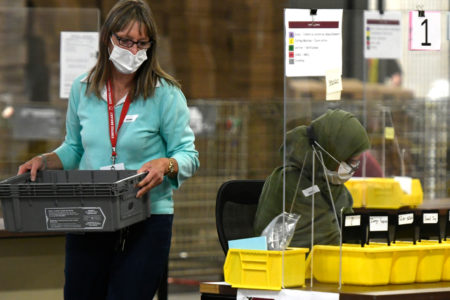
The federal election of 2011 marked a tectonic shift in Canada’s political landscape. “Tsunami” was the other metaphor used. One point was clear, however. Good news for the Conservatives and New Democrats meant bad news for the Bloc Québécois in Quebec, as well as for the Liberals in Quebec and in the rest of the country. Conventional wisdom has it that Canada will move in the direction of the United States or Britain, and have a straightforward ideological split between parties of the left and right.
At first blush, events seem to be moving that way. Consider Britain. The Liberal Democrats (known better by the shorthand version of their name, the Lib Dems) are roughly similar to our Liberal Party. Like Canada’s Liberal Party, they were once dominant, only to be squeezed by the Labour Party (a party that openly championed the interests of the working classes in a society that was industrializing; later, as more manufacturing jobs were outsourced to other countries, it began deindustrializing) on one side of the political spectrum, while the Conservative Party squeezed them on the other. When the Lib Dems decided to enter a coalition government with the Conservatives after the 2010 election, many party insiders felt that too many compromises were made in order to gain power. People outside the party were of the same opinion. Consequently, the party leader, Nick Clegg, looked weak. Lib Dem support fell in the polls. Britain’s first-past-the-post electoral system had, like its counterpart in Canada, failed to act in a neutral manner. The party that gained the largest proportion of the vote often gained, and was meant to gain, a larger proportion of the seats in the House of Commons. The system worked against parties like the Lib Dems. Not unnaturally, then, the party had long campaigned for the reform of Britain’s institutions, starting with the voting system. Clegg pushed the Conservatives to hold a referendum on electoral change. Britain had not held a national referendum for 36 years, with the last referendum being the decision to join what is now the European Union.
The latest referendum was about a change to the first-past-the-post electoral system. But the proposed change did not go the entire way toward a system of proportional representation, one in which a party that received 40 percent of the votes in an election would receive 40 percent of the seats. That system, it was decided, would give too much sway to party bosses and insiders. An alternative vote, or AV, system was proposed instead, one in which voters would rank the candidates in order of preference. If someone failed to achieve a majority of 50 percent of the votes in the first round, then other preferences would come into play. It was a serious move for change, but was it seriously debated? No. The Yes side and the No side enlisted numerous sport figures and celebrities.
Some commentators had uncharitably made the point that by being outside of power for so long, the Conservatives had, like any party in opposition, picked up their share of nut cases. Therefore there was a pressing need to keep everyone “on message.” In political circles this is what they call “strategy.” For opponents this is always evidence of dictatorial tendencies, but for the rest of us it is common sense.
David Cameron, the Conservative prime minister, at first gave an undertaking that he would not play a major role in the campaign, an undertaking that he broke as soon as the debate grew more excited and when it became obvious that he had much to lose in terms of his own credibility. The present system, Cameron argued, is simple and clear. The alternative, he further maintained, only offered the prospect of more turmoil and endless minority governments, with minor parties holding the balance of power. (The fact that he himself headed a coalition government was one of the ironies of the situation that he passed over lightly.) In other words, if it ain’t broke, don’t fix it. The referendum was held at the same time as a number of local elections outside of London. London newspapers speculated openly that this might skew the result and give an advantage to those who wanted reform and who lived outside of the capital. However, that worry was needless. The referendum was defeated by a margin of almost two to one. At the same time, the Lib Dems had their worst showing at the polls in over a generation in the local elections. In a time of economic uncertainty and public sector austerity, voters did not want to take the first step in what seemed to be a perilous set of constitutional changes.
These events took place a few days after Canada’s election. What patterns emerged from these series of events? It would appear that electors are not interested in the processes of government. In Canada, the opposition parties tried to make political hay out of Harper’s propensity to prorogue Parliament and to use his whip hand to control his own party. He expanded the influence of the Prime Minister’s Office and the executive powers of government while not expanding the legislative powers of Parliament in a commensurate manner. (Some commentators had uncharitably made the point that by being outside of power for so long, the Conservatives had, like any party in opposition, picked up their share of nut cases. Therefore there was a pressing need to keep everyone “on message.” In political circles this is what they call “strategy.” For opponents this is always evidence of dictatorial tendencies, but for the rest of us it is common sense.) But these matters did not excite much interest.
Some must have hoped that a majority government might give Harper an incentive to move toward Senate reform. The German system of having an upper house that includes the equivalent of our premiers might be one model worth emulating. The Germans also have a modified system of proportional representation. In Britain, efforts to reform the House of Lords are likely to be bypassed by a whole range of other issues that will preoccupy the government for the near future, not the least of which is the way both the Tories and the Lib Dems will have to quell backbenchers in their own parties who are unhappy with the creaky coalition arrangements. For their part, the Conservatives have astutely avoided the controversial issue of electing representatives to the upper house, the House of Lords, leaving that to the Lib Dems instead. It is a maxim of politics that parties in opposition want to reform the institutions of power when they are in opposition, but when they are in government, their enthusiasm wanes. And so it is for the Lib Dems, who have had a base in local government but who have been shut out of power at the national level for several generations.
In Canada, pollsters will attest that there is not much call for Senate reform or for abolition of the upper chamber. But electoral reform will be an issue — at least for party stalwarts. After the election, Libby Davies, the veteran NDP member of Parliament who has been pushing this issue, said: “The fact is that the Conservatives only squeaked up a couple of percent in terms of popular vote, and yet they got a majority.” She added: “The first-past-the-post [set-up] does create those kinds of results that do not reflect the way people are voting. I think more and more people are getting that.” Whether they “get it” enough to make it a priority issue in the next Parliament is, of course, a different issue.
Like his British counterpart, our prime minister recognizes the fact that electoral reform is a hard sell at the polls. Electoral reform, or relating the wider processes of democratic reform to the structures of government, is difficult to explain to an electorate that has not been accustomed to examining the nuances of campaign issues in the hothouse atmosphere of an election campaign. But this is not the only factor. There are many vested interests that have a built-in tendency to go with the system that they know best and that, it might be added, has benefited them in the past.
This takes us back to the recent Canadian federal election. Another way of looking at the results is that there was not a divide between parties of the left and right; there was a collection of regional elections in which the decisive factor was the swing vote, decided by people who declared themselves to be independents and who did not want to be associated with particular parties and, more importantly, with the party line. Much of the reaction against the Bloc in Quebec arose from the fact that it was identified with the now ancient struggle of separatists against federalists. There continues to be a hard-core nationalist vote — as opposed to a somewhat smaller separatist vote — that will always be a powerful presence in Quebec. Jack Layton played to that vote by promising more decentralization. The Conservatives did the same, but their brand had been tarnished by threats of cutbacks to funding for the arts, which form the core of the Quebec identity. The Liberal brand remained tarnished by the sponsorship scandal and the subsequent oldschool politicking that was closely identified with the fall-out from the scandal. So the NDP just kicked in an open door — which explains why you now have 19-year-olds sitting in the House of Commons. And why the primary focus for Layton in the next several months will be to try to keep a restive Quebec caucus from attempting to take over the party. Replacing Layton with Thomas Mulcair would be the first step in that trajectory.
For the federal Liberals, this is a time of both challenge and opportunity. The challenge comes from the fact that they ended up with 18.9 percent of the popular vote and 34 seats. This marks a historic low. But what goes down must come up. The vote can be seen as a vote against not the small-l liberal values that animate the core of the party, but the fact that the party was not able to shed its image of itself as the government party. True, in the 20th century it had been one of the most successful parties in the developed world, able to take credit for the great achievements in national politics that people associate with being Canadian. Medicare, the Canada Pension Plan, the flag, the Charter, the Official Languages Act, bilingualism and multiculturalism — achievements all, but at the same time, they will always be viewed through a nationalist lens by a significant portion of the population in Quebec.
To sharpen the point, these achievements do not speak to the day- to-day concerns of Canadians in the 21st century. They were achievements that arose from the historic fact that the Liberals governed because in the past century, as in centuries before, there were constant threats to the unity of this country from Quebec nationalists. With an electoral base in Quebec, the Liberals could reach out to an electorate in Ontario and then to other regions of the country, such as Atlantic Canada, and promise strong, managerial government from the centre. These conditions no longer obtain. But the Liberal Party continued to act as if it was the government party — the only party capable of governing or, more to the point, governing competently without being in the thrall of left- and right-wing ideologists. A kind of governing party arrogance was built right into the party DNA, and this is what the electors rejected so emphatically on May 2, 2011.
It follows that the biggest mistake the party could make at this point would be to follow the party constitution in its present form, and go into a leadership convention. Too often in the past, the party has relied upon stars from another field of activity to ride in as white knights to save the party from oblivion. Lester Pearson won the Nobel Prize and was what we would now call a global diplomat. Pierre Trudeau had made his name in academia. Why did this repeatedly happen? Simply by being associated with power, the party could bring in the best and the brightest. Pierre Trudeau, who had long been associated with the predecessors to the New Democratic Party, was once asked why he chose not to run for them. His answer was straight forward: “Because I want to get things done.” He explained that if he ran as a socialist, it would be like being a monk. He would be ideologically pure, but he would not have a real chance to influence events.
The most important thing that the Liberal Party can do now is to keep an interim leader in place for the longest possible time so the party can get back to essentials. This means rebuilding, street by street, block by block. It means doing some serious fundraising so the party is not broke, but fundraising that is directed from community-based efforts. It means starting small. It also means you stand for something. To try to be popular with everyone means being open to the accusation that you are a wimp. Martha Hall Findlay, a former leadership contender for the Liberal Party, spoke to this tendency when she said, on TVO’s The Agenda: “We have to stop trying to be everything to everybody.” She candidly acknowledged that she “appreciate[d] the Big Red Tent, but we have to have the guts to say we’re not going to represent absolutely everybody and we have to lose the timidity.”
The most important thing that the Liberal Party can do now is to keep an interim leader in place for the longest possible time so the party can get back to essentials. This means rebuilding, street by street, block by block. It means doing some serious fundraising so the party is not broke, but fundraising that is directed from community-based efforts. It means starting small. It also means you stand for something.
It also means rejecting talk of a merger of the left at this point. The New Democrats are a party based in social democracy; the Liberals, by contrast, will always be identified with liberal values. Social democrats will have close ties to unions, Liberals will not have that institutional identification. These divisions reflect a more fundamental reality. Socialism will always be about equality of condition (in some measure this will involve making everyone equal) while liberalism will be about equality of opportunity (which means, by all the means possible, giving everyone the same chance for a start in life). It is true that having three parties — the Liberals, the NDP and the Greens — associated with progressive politics will give the Tories a permanent grip on power, something Stephen Harper has made his life’s work. (The Bloc fits into the progressive mould but it will not be a presence outside of its home province.)
The Liberals have emerged from the election “bloody, but not bowed.” For parties that took a beating in the recent polls, now is the time for rebuilding. Canada will be the better for it — better because a party system polarized by the strict ideologies of conservatism and socialism will devolve power down to the provinces. The Liberals have an opportunity to show that they can bring a vision of the Canada of the future to Canadians, one that involves a strong central government, but one that will encourage entrepreneurialism and innovation while cutting red tape and needless bureaucracy and, more importantly, one that can play a key role in unleashing the creativity and entrepreneurial drive of individuals and communities. The parties that speak to these needs will be the parties that are rewarded at the polls. Parties, ultimately, operate in a marketplace of ideas, where they also have to reconcile their own internal divisions. The ideas that resonate are the ones that connect the everyday concerns of ordinary Canadians to a larger vision of where Canada is moving in the world. But for those who wait, hoping that their turn will come next time, the next tsunami could take them out.
Photo: Shutterstock







